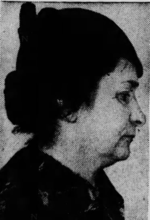 AP James Streeto, a 50-year-old caretaker at the Boxwood Manor in Old Lyme, Connecticut, was murdered on Christmas Eve of 1943 in his home on the Boxwood Manor Estate. Delphine Bertrand, a 53-year-old undocumented immigrant from Canada, who also worked at Boxwood Manor, had been visiting Streeto the night of the murder and called the state police to report the crime. Bertrand, who was being courted by Streeto, told police that Streeto called on her that evening and took her to his home. She claimed that about 10:00 p.m., three men in their twenties stormed into the house, took $20.00 from her, tied her up, and took Streeto to another room where she heard a “terrific tussle.” After working for an hour to untie the cords with which she was bound, she went to a neighbor’s house and called the Westbrook Barrack of the state police. Bertrand said that after the attack, the three men entered a car and drove off. According to police, a gun, knife and club had been used during the attack on Streeto. The medical examiner reported that Streeto’s head was battered, and he had been shot through the ribs on one side and stabbed through the ribs on the other side. Bertrand was sent to the New London County Jail for questioning in connection with the slaying as a material witness. At first, Bertrand denied any part in the slaying and described in detail how the murder occurred. However, on February 10, 1944, she confessed to New London County Coroner Edward J. McKay that she had committed the murder. Less than two hours after McKay issued his finding, which held Bertrand criminally responsible for the slaying of Streeto, she was arrested and taken to the Old Lyme court before Justice Shirley Saunders. Although she had been held for two months as a material witness, she had not been arrested. On April 4, 1944, Bertrand was indicted in Superior Court by a grand jury for second-degree murder, which carried a mandatory life sentence in Connecticut. However, in Superior Court proceedings before Judge Edward J. Daley, State’s Attorney Arthur M. Brown, along with Bertrand’s defense attorney, recommended that Bertrand be permitted to plead guilty to the lesser charge of manslaughter and that the court impose a minimum sentence of 10 years. Investigation into Bertrand’s background revealed that she had used a variety of names after moving from Canada in 1918 to the New Haven community and working as a housekeeper. During that time, she had been sentenced to jail twice on undisclosed statutory charges. She had worked for two years at Boxwood Manor as a housekeeper, but little was known about her and she was regarded as a “mystery woman.” According to Bertrand’s confession, she met Streeto through mutual acquaintances before working at Boxwood Manor. Apparently, she and Streeto had a “considerable argument” over Streeto’s interest in another woman, which became violent, resulting in the shooting death of Streeto. Bertrand then ran from the house, threw the gun into the bushes, and told a neighbor that Streeto had been hijacked, murdered and robbed by three men and that she had been bound by them after they attempted to rape her. The gun was never found. On April 11, 1944, Bertrand pled guilty to manslaughter and was sentenced to 10 to 15 years. The Streeto murder investigation was reopened less than two years later when Philip Contino of New London, while being interrogated with regard to a recent robbery, confessed that he and three other men entered the Streeto home, intending to rob him. Contino admitted that he and his accomplice, Marvin Beebe, also of New London, killed Streeto. They were subsequently sentenced to six to seven years in prison after pleading guilty to manslaughter. Two other men, present in the Streeto house during the killing, assisted the state in its second investigation. Bertrand’s attorney, S. Bennett Alderman, discovered that the scenario in her confession had no basis in reality. Rather, Bertrand had been counseled by a cellmate to confess to manslaughter in order to avoid a possible death sentence if she were to be convicted of murder at trial. Based on the confession of the true perpetrator, Bertrand’s case was reopened by the Superior Court on June 5, 1946 and the manslaughter charges against Bertrand were dismissed. Immediately after leaving court following this dismissal, Bertrand was taken into custody by immigration officials for deportation to Canada based on grounds of moral turpitude relating to her convictions for misconduct prior to the Streeto case. - Stan Matthews |